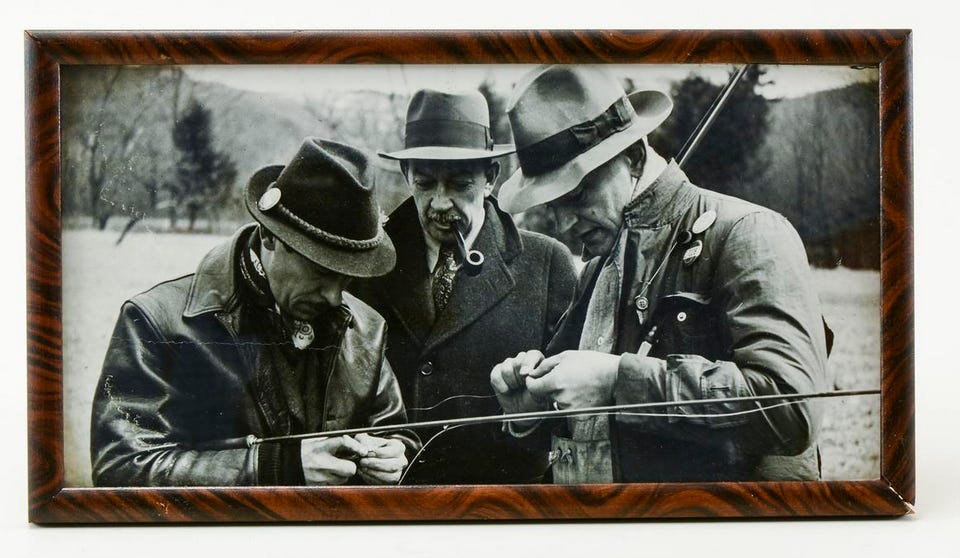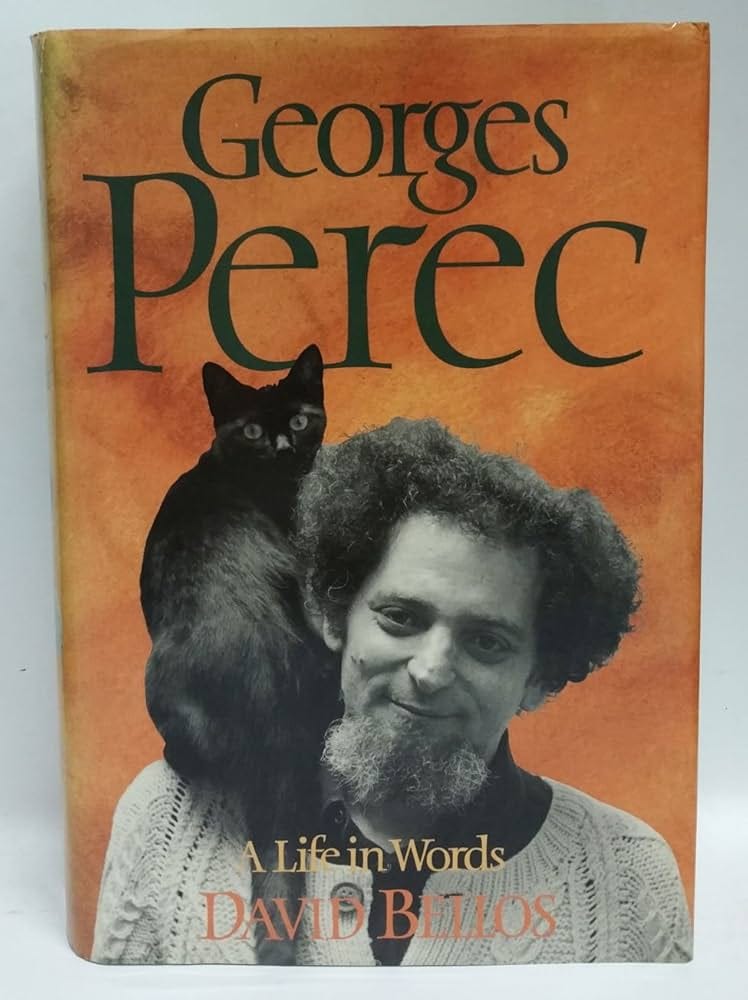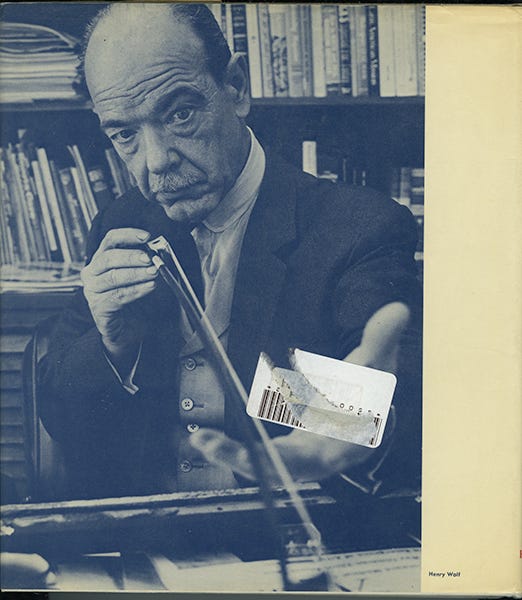I wrote this on the day in question, hence the title’s double meaning. I made small edits this next day, but have left it mostly the same. A continued commitment to the practice of word play and word labor, as I’m trying to think it. General Research I’d say.
If you like what I do and appreciate word’s play/labor, consider subscribing with money, could be cool if you did!
All of the images were sent to me in the email I mention below, so a big thank you to Joseph Grigely, and I hope he does not mind my informal use of his first name below, it felt odd to be too formal here.

Its a bit of a pun, which is itself something of a dirty word at this point, but I’ve been reading Georges Perec and so I’ve been thinking of word’s play. My friend, teacher, and avid angler Joseph Grigely sent me an email this morning that was his own kind of On Labor Day, but specifically about the editor Arnold Gingrich who was himself also an avid angler and wrote books on the subject, but also had this to say about Al McClane (which is part of where Joseph wanted to go with Gingrich), "For twenty-five years Al McClane had an office, but it was one where, if he showed up there, he was likely to be asked, ‘Why the hell aren't you out fishing?’ For common mortals who have an office, when they don't show up there, but have been out fishing instead, the question is, of course, ‘Where the hell have you been?’ Obviously any man who can arrange to get that question reversed is just as much smarter as all the rest of us.” Its a curious thing, what we designate as our labor, and I had the thought last night that I don’t often allow myself to drift off in my mind, allowing boredom, or even allowing myself to loaf, a long neglected art as Joseph would have it. I’m writing this while I steal away time working a slow shift that requires little of my energy and much of my presence. Twice now people have avoided the act of tipping, itself a newly neglected art. And on Labor Day of all days. Loafing, as Joseph points out to me—especially he says when a scotch is in hand—gets us to what Keats would called “delicious diligent Indolence.’ And Keats even goes so far as to capitalize the word: it is proper and properly important!

Serec is someone who prioritized the little materialisms. Mundane and infra-ordinary, so mundane it goes without saying. Add to this a love for word’s little plays they put on, and their thingliness and you have a delightfully mundane theatrical production that constitutes Serec’s writings. I began reading his collection of writings Species of Spaces and Other Pieces (my friends and I continuously keep reading the title on the cover as Species of Spaces and Other Places) last night and I felt as if I found someone who writes like me; that is the labor of his writing felt in concert with mine, or in theatre if you’ll allow it.
What could be said to be labor in its divisive state: skilled and unskilled, essential and inessential, blue and white, physical and mental, menial and complex. Value as it is accorded is lopsided and imprecise and is perhaps besides the point. If there is word play, then what would be word labor, Serec writes, “There are few events which don’t leave a written trace at least…” and goes on to list numerous examples. His comes with the caveat that he quite enjoys to write, so perhaps his notion is skewed, but this could maybe be the word labor we’re looking for. What it does, what it means to do, what it does to make something mean. Although descriptive language can be dismissed as flowery and excessive, and necessary writing—the bureaucratic and documentary for example—as mundane and boring, if you read Serec’s words which can sometimes be both of these at once, living in the infra-ordinary, it becomes another third thing. And it is only because he lays it out in a different way that we see the labor of words and their necessity. Words can do imaginative and complex labor on reality that we may otherwise dismiss as going without saying.
Is there something to saying that which goes without it? Joseph’s email in regard to Labor Day ended with the admission that it had more to do with bibliography than Gingrich’s angling, sending to me many images of the back covers of Gingrich’s books where he looks distinguished—or at least more so than most do on the backs of their books; it makes me think of the intensity of Shel Silverstein’s portraits in contradistinction with what people imagine—and they are true joys of back book covers. They come at the end of his labor, and show a man truly in moments of thoughtful, pleasure? Maybe, at least if one looks behind the stern focus and solemnity that conclusion could be made. After all many of the books are on the act of angling, an incredibly meditative and joyful act that stems from the necessity of laboring for food. Angling is both at once.

In his short piece Angling as Optimism Joseph writes about the joys of being an angler, and follows through on the importance of those things which sit on the outskirts of our practices and our labors. As he quotes Aldo Leopold, “a satisfactory hobby must be in large degree useless, inefficient, laborious or irrelevant.” And it’s these qualities I’m trying to think of as virtues. What can we find in reevaluations of value, flipping what we admire. What we desire. Big things are important, but forest for the trees, or in Joseph’s case rivers for the trouts. In my case it is to say you see one by seeing the other, a reversal of the usual saying. Joseph elucidates just how it is that returning to the water, spending time in it even when nothing comes, let’s one see the patterns, see the big changes that are happening, in this case, to our environment. You see shifts in people and their patterns behind a bar; often you see a lack of it. I wonder what our labors to simply live reveal about us, and I always dream of a savings account and comfortability, if only because lack of these makes it hard to dream of anything else. Little banalities seem to me worth attending to, if only to focus, relax, and allow ourselves a chance to rest our eyes before returning to the bigger picture. Maybe that’s why so many are required to work on Labor Day. I hope to get back to word play in my word labors soon.
Joseph offered once to teach me fly fishing, and while I fear the slimy, and don’t know what I’d do with a trout if I caught it, I’d still like to one day. Perhaps if only because I think I’d like very much to rest, even if, and perhaps it would be because, I have my feet planted firmly in a river feeling life’s activities fly by.




